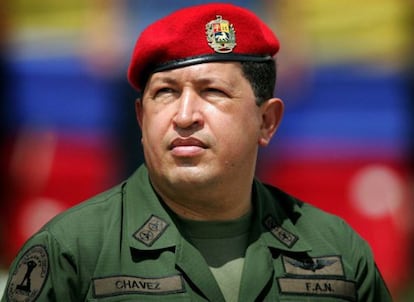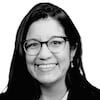The coup leader who won at the polls
Baseball-loving leftist triumphed in four elections and changed the Constitution

The first time Hugo Chávez appeared on television was on the morning of February 4, 1992 when he asked his rebel troops to surrender after a failed coup launched against President Carlos Andrés Pérez. “Men, unfortunately, for now, the objectives we set out to reach in the capital were not accomplished […] Listen to me, listen to your commander Chávez, who is asking you to please reflect and lay down your weapons.”
The then 37-year-old paratrooper was unable to take Miraflores presidential palace in Caracas. His accomplices were able to capture strategic points across the country, including the oil-rich Zulia state. But the words “for now,” heard throughout Venezuela on radio and television, was seen as a vow he would one day return.
Hugo Chávez Frías was born in Sabaneta, Barinas state, on July 28, 1954. In 1971, he entered the military academy with the idea of leaving his home town and going to the capital Caracas, with the hopes that some baseball scout from the United States would recruit him for the major leagues. He was known as “the fiery left-handed pitcher” among his army buddies, who also remember him “an excellent first baseman.”
He remained on the mound for more time he should have been there, relishing his moment
Along with his budding baseball dreams and military career, Chávez began dabbling in leftist movements, encouraged by his brother Adán, who had been part of a guerrilla movement in the 1960s. The eventual goal was to dismantle the two-party system — the Social Democrats of Acción Democrática and the Christian Democrats of Copei — which had dominated Venezuelan politics since democracy was restored in 1958.
One of Chávez’s dreams was achieved when he was invited to throw the first pitch at the Met’s old Shea Stadium in New York six months after he had first been elected president. Afterwards, he remained on the mound for more time he should have been there, relishing his moment in the middle of a major league baseball field and waving to the thousands of cheering spectators.
Chávez won his first elections on December 6, 1998 with 56.4 percent, running under the V Republic Movement (MVR) banner. At the time, two-thirds of the Venezuelans said they didn’t believe in political parties as an institution because they found them corrupt. As soon as he was sworn into office, Chávez proposed broad constitutional reforms, including eliminating the bicameral Congress. The Constitution, redrafted and approved in 1999, called for new elections in 2000, which Chávez easily won with nearly 60 percent of the vote.
He promised to govern up to 2021 “or as long as God gives me life”
But the opposition had grown angry over the president’s authoritarian manner. In December 2001, he decreed some 49 laws that gave him broader powers. In a controversial live broadcast on April 7, 2002, he fired the entire management at the state-owned Petróleos de Venezuela (Pdvsa). Four days later, thousands of Venezuelans marched on Miraflores to demand his resignation; it turned into a violent showdown between chavistas and the opposition with dozens of people killed and many more injured.
That day ended with a coup launched by a group of military officers backed by opposition politicians and businessmen. Chávez was detained and taken to La Orchilla island. But the rebellion only lasted 48 hours, ending when loyalist troops rescued the president and brought him back to Caracas.
An August 2004 referendum, held to decide whether to revoke his term in office was also won by Chávez. Fueling the president’s free-spending ways and regional influence was the soaring price of oil, which shot up to more than $124 a barrel between 2005 and 2008. Chávez supplied cheap oil to several regional allies, including the Castro regime in Cuba.
In 2009, he proposed an amendment to the Constitution that lifted his term limits and allowed him to run for re-election indefinitely. He promised to govern up to 2021 “or maybe 2031 or 2049, or as long as God gives me life.” But it was the cancer diagnosed in June 2011 that prevented Chávez from entering the fourth term he won last October.
Tu suscripción se está usando en otro dispositivo
¿Quieres añadir otro usuario a tu suscripción?
Si continúas leyendo en este dispositivo, no se podrá leer en el otro.
FlechaTu suscripción se está usando en otro dispositivo y solo puedes acceder a EL PAÍS desde un dispositivo a la vez.
Si quieres compartir tu cuenta, cambia tu suscripción a la modalidad Premium, así podrás añadir otro usuario. Cada uno accederá con su propia cuenta de email, lo que os permitirá personalizar vuestra experiencia en EL PAÍS.
¿Tienes una suscripción de empresa? Accede aquí para contratar más cuentas.
En el caso de no saber quién está usando tu cuenta, te recomendamos cambiar tu contraseña aquí.
Si decides continuar compartiendo tu cuenta, este mensaje se mostrará en tu dispositivo y en el de la otra persona que está usando tu cuenta de forma indefinida, afectando a tu experiencia de lectura. Puedes consultar aquí los términos y condiciones de la suscripción digital.









































